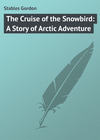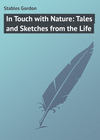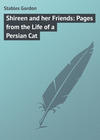Kitabı oku: «In Far Bolivia: A Story of a Strange Wild Land», sayfa 8
CHAPTER XVI-ON THE BANKS OF A BEAUTIFUL RIVER
They would not allow Benee to harbour for asingle moment the idea of stealing the queenand escaping with her into the forest.
Two thousand armed men were stationed within amile of the camp, so Benee would speedily be killed, and in all likelihood Queen Peggy also.
No; and he must go no farther into the land of thecannibals.
But he, Shooks-gee, undertook to give the queena little note-book, in which a letter was written fromher "brother", stating that all haste was being madeto come to her deliverance. He would receive backthe note-book, and therein would doubtless be writtenpoor Peggy's letter. Meanwhile Benee must wait.
Shooks-gee started on his mission next day.
He was away for a whole week, but it seemed buta few hours to Benee. He had divested himself ofhis arms, and given the cloth and beads to Weenah'smother. Then all the dear old life of his boyhoodseemed to be renewed. Weenah and he wanderedwild and free once more in the forest and over theheath-clad plains; they fished in lake and stream; they ate and drank together under the shade of thepine-tree, and listened to the love-song of the sweetsoo-soo.
It was all like a happy, happy dream. And is notthe love-life of the young always a dream of bliss?Ah! but it is one from which there is ever anawakening.
And with the return of Shooks-gee, Benee's dreamcame to an end.
Peggy had written her long, sad story in the notebook.
Benee knew it was long, but he could not read it.
Then farewells were said.
The child Weenah clung to Benee's neck and wept.She thought she could not let him go, and at last hehad to gently tear himself away and disappear speedilyin the forest.
Just one glance back at Weenah's sad and wistfulface, then the jungle swallowed him up, and he wouldbe seen by Weenah, mayhap, never again.
—
It was not without considerable misgivings thatRoland and Dick Temple made a start for thecountry of the cannibals.
The relief party consisted but of one hundredwhite men all told, with about double that numberof carriers. It was, of course, the first real experienceof these boys on the war-path, and difficulty afterdifficulty presented itself, but was bravely met andovercome.
"Uneasy lies the head that wears a crown."
Probably the general of an army, be it of whatsize it may, is more to be pitied than even a king.The latter has his courtiers and his parliament toadvise him; the general is princeps, he is chief, andhas only his own skill and judgment to fall back upon.
It had been suggested by Burly Bill that insteadof journeying overland as a first start, and havingto cross the whirling river Purus and many lesserstreams before striking the Madeira some distanceabove the Amazon, they should drop down-stream insteamer-loads, and assemble at the junction of theformer with the latter.
Neither Roland nor Dick thought well of the plan, and herein lay their first mistake. Not only was itweeks before they were able to reach the Madeira, but they had the grief of losing one white man andone Indian with baggage in the crossing of the Purus.
We cannot put old heads on young shoulders; nevertheless the wise youth never fails to profit bythe experience of his elders.
Even when they reached the forest lands on thewest side of the Madeira, another long delay ensued.For here they had to encamp on somewhat damp andunwholesome ground until Burly Bill should descendthe stream to hire canoes or boats suitable for passingthe rapids.
Don Pedro or Peter was now doing his best to makehimself agreeable. He was laughing and singing allday long, but this fact in no way deceived Roland, and as a special precaution he told off several whitemen to act as detectives and to be near him by dayand by night.
If Peter were really the blood-guilty wretch thatRoland, if not Dick, believed him to be, he made onemistake now. He tried his very utmost to makefriends with Brawn, the great Irish wolf-hound, butwas, of course, unsuccessful.
"I sha'n't take bite nor sup from that evil man'shand," Brawn seemed to say to himself. "He looksas if he would poison me. But," he added, "he shallhave my undivided attention at night."
And so this huge hound guarded Peter, never beingten yards away from the man's sleeping-skin till upleapt the sun in the gold and crimson east and shoneon the waters of the beautiful river.
"That dog is getting very fond of you, I think,"said Roland one day to Peter, while Brawn wassnuffing his hand. "You see how well he protects you bynight. He will never lie near to either Dick or me."
Peter replied in words that were hardly audible, but were understood to mean that he was obliged toBrawn for his condescension. But he somewhat marredthe beauty of his reply by adding a swear-word ortwo at the end.
While they waited in camp here for the return ofBill and his crews, they went in for sport of severalsorts.
The fish in this river are somewhatremarkable-remarkable alike for their numbers and for theirappearance-but all are not edible.
"How are we to know, I wonder, which we shouldcook and which we shouldn't?" said Roland to hisfriend, Dick Temple.
"I think," replied Dick, "that we may safely cookany of them, but, as to eating, why, I should only eatthose that are nice in flavour."
"That's right. We'll be guided by that rule."
The boys fished from canoes which they hired orrequisitioned from the Indian natives of the place.Clever these fellows are, and the manner in whichthey watch for and harpoon or even spear a huge"boto" – which looks like a long-snouted porpoise or"sea-pig" – astonished our heroes.
This fish is killed by whites only for its oil, butthe Indians did not hesitate to cut huge fourteen-poundpieces from the back to take home for culinary purposes.
The "piraroocoo" is an immense fellow, and calculatedto give good sport for a long summer day if youdo not know how to handle him.
This "'roocoo", as some of the natives call him, likes to hang around in the back reaches of the river, and is often found ten feet in length.
He has the greatest objection in the world to beingcaught, and to being killed after being dragged onshore. Moreover, he has a neat and very expert wayof lifting a canoe on his back for a few seconds, andletting it down bottom-upwards.
When he does so, you, the sportsman or piscador, find yourself floundering in the water. You probablygulp down about half a gallon of river water, butyou thank your stars you learned to swim when aboy, and strike out for the bank. But five to oneyou have a race to run with an intelligent 'gator. Ifhe is hungry, you may as well think about some shortprayer to say; if he is not very ravenous, you maywin just by a neck.
This last was an experience of Dick's one day; when a 'roocoo capsized his frail canoe and his Indianand he got spilt.
Luckily Roland was on the beach, and just as ahuge 'gator came ploughing up behind poor Dick, with head and awful jaws above water, Roland tooksteady aim and fired. Then the creature turned onhis back, and the river was dyed with blood.
The natives salt the 'roocoo and eat it. ButRoland's Indian carriers managed to get through asmany as could be caught, without any salt worthspeaking about.
Surely the fish in this beautiful river must havethought it strange, that so many of their numberwere constantly disappearing heavenwards at the endof a line. But it did not trouble them very much afterall, and they learnt no lesson from what they saw, buttook the bait as readily as ever.
There were very many other species of fish, whichnot only gave good sport but made a most deliciousaddendum to the larder.
Boats and canoes were now in the river all daylong, and with the fish caught, and the turtle whichwere found in great abundance, not to mention thewild animals killed in the woods, Roland managed tofeed his little army well.
There is one fish in this river which is sometimescalled "diabolo". He is no relation at all, however,to the real octopus or devil-fish, for this creature isflat. It seems a species of ray, and has an immensemouthful of the very sharpest of teeth. He is notat all dainty as to what he eats. He can make ameal off fresh-water shell-fish; he can swallow hissmaller brothers of the deep; take a snack from adead 'gator, and is quite at home while discussinga nice tender one-pound steak from a native's leg.
The young 'gator is neither fish, flesh, nor goodred-herring. Yet if you catch one not over a yard long, and he doesn't catch you-for he has a wicked way ofseizing a man by the hand and holding on till hismother comes, – his tail, stewed or fried with a morselof pork, will tide you over a "hungry hillock" verypleasantly indeed.
If we turn to the pleasant reaches of the RiverMadeira, or the quiet back-waters, and, gun onshoulder, creep warily through the bush and scrub,we shall be rewarded with a sight that will wellrepay our caution.
Here of an early morning we shall see water-fowlinnumerable, and of the greatest beauty imaginable.
Hidden from view, one is loth indeed to fire a shotand so disturb Nature's harmony, but prefers, for a timeat all events, to crouch there quietly and watch thestrange antics of the male birds and the meek docilityof the female.
Here are teal, black ducks, strange wild geese, brown ducks, sheldrakes, widgeons, and whatnot.
And yonder on the shore, in all sorts of drollattitudes with their ridiculously long necks and legs, arestorks and herons. I think they like to performtheir toilet close to the calm pellucid water, because itserves the same purpose to them as a bedroom mirrordoes to us.
Young tapirs form a welcome addition to the larder, and the woods all round abound in game.
What a paradise! and yet this country is hardlyyet known to us young Britons. We hear of ague.Bah! Regularity of living, and a dust of quinine, and camping in the open, can keep fever of all sortsat bay.
Some may be surprised that our heroes should havesettled down, as it were, so enthusiastically to fishingand sporting, although uncertain all the while as tothe fate of poor kidnapped Peggy.
True, but we must remember that activity andconstant employment are the only cure for grief.So long, then, as Roland and Dick were busy withgun or fishing-rod, they were free from thoughtand care.
But after sunset, when the long dark night closedover the camp; when the fire-flies danced from bushto bush, and all was still save the wind that sighedamong the trees, or the voices of night-birds andprowling beasts, and the rush of the river fell on theear in drowsy, dreamy monotone, then the boys felttheir anxiety acutely enough, but bravely tried togive each other courage, and their conversation, oft-repeated, was somewhat as follows: -
Roland. "You're a bit gloomy to-night, Dick, I think?"
Dick. "Well, Roll, the night is so pitchy dark, nevera moon, and only a star peeping out now and then.Besides I am thinking of-"
Roland. "Hush! hush! aren't we both alwaysthinking about her? Though I won't hesitate to sayit is wrong not to be hopeful and cheerful."
Dick. "But do you believe-"
Roland. "I believe this, Dick, that if thosekidnapping revengeful Indians had meant murder theywould have slain the dear child in bed and not haveresorted to all that horrible trickery-instigatedwithout doubt by somebody. She has been taken tothe country of the cannibals, but not to be tortured.She is a slave, let us hope, to some Indian princess, and well-guarded too. What we have got to do isto trust in God. I'm no preacher, but that is so.And we've got to do our duty and rescue Peggy."
Dick. "Dead or alive, Roland."
Roland. "Dead or alive, Dick. But Heaven havemercy on the souls of those who harm a hair of herhead!"
—
Dick did his best to trust in Providence, but oftenin the middle watches of the night he would lie in histent thinking, thinking, and unable to sleep; then, after perhaps an uneasy slumber towards morning, awake somewhat wearily to resume the duties ofthe day.
CHAPTER XVII-BILL AND HIS BOATS
Roland, young and inexperienced as he was, proved himself a fairly good general.
He certainly had not forgotten the salt, noranything else that was likely to add to the comfort ofhis people in this very long cruise by river and by land.
They knew not what was before them, nor whattrouble or dangers they might have to encounter, soour young heroes were pretty well prepared to fightor to rough it in every way.
Independent of very large quantities of ammunitionfor rifles and revolvers, Roland had prepared aquantity of war-rockets, for nothing strikes greater terrorinto the breasts of the ordinary savage than thesefire-devils, as they term them.
Roland, Dick, and Bill each had shot-guns, withsheath-knives, and a sort of a portable bill-hook, which many of the men carried also, and foundextremely handy for making a clearance among reeds, rushes, or lighter bush.
We have already seen that they had plenty offishing-tackle.
Oil and pumice-stone were not forgotten, andRoland had a regular inspection of his men every day,to make certain that their rifles and revolvers wereclean.
But this was not all, for, to the best of their ability, both Roland and Dick drilled their men to the useof their arms at short and long distances, and taughtthem to advance and retire in skirmishing order, taking advantage of every morsel of cover which theground might afford.
Plenty of maize and corn-flour were carried, andquite a large supply of tinned provisions, from theplantation and from Burnley Hall. These includedcanned meat, sardines, and salmon.
Extra clothing was duly arranged for, because fromthe plains they would have to ascend quite into theregions of cloud and storm, if not snow.
Medicine, too, but only a very little of this, Rolandthought, would be needed, although, on the other hand,he stowed away lint and bandages in abundance, witha few surgical instruments.
Medical comforts? Yes, and these were not to beconsidered as luxuries, though they took the form ofbrandy and good wine.
Good tea, coffee, cocoa, and coca were, of course, carried, with sugar to sweeten these luxuries.
But a small cask of fire-water-arrack-wasincluded among the stores, and this was meant as atreat for native Indians, if they should happen tomeet any civil and obliging enough to hobnob.
Money would be of no use in the extreme wilds.Salt, and cloth of gaudy colours, to say nothing ofbeads, would be bartered for articles of necessity.
—
Everything was ready for the start, but still therewere no signs of Bill and the boats.
It was the first question Roland asked Dick of amorning, or Dick asked Roland, according to whohappened to be first up:
"Any signs of Bill and the boats?"
"None!"
On the top of a cliff at the bend of the beautifulriver stood a very tall tree, and right on top of thiswas an outlook-an Indian boy, who stayed two hourson watch, and was then relieved.
He could command quite an extensive view downstream, and was frequently hailed during the day andasked about Bill and his boats, but the answer wouldcome somewhat dolefully:
"Plenty boat, sah, but no Beel."
Yes, there were boats of many kinds, and a fewsteamers now and then also, but Roland held nointercourse with any of these. His little army wasencamped on an open clearing well back in the forest.He did not wish to know anyone's business, and hedetermined that his own should not leak out.
But although Roland and Dick had plenty to do, and there was sport enough to be had, still the timebegan to drag wearily on day by day, and both youngfellows were burning for action and movement and "go".
Peter, alias Don Pedro, seemed as anxious asanyone else to get forward.
He was most quiet and affable to everyone, althoughapt to drop into dejected moods at times.
He saw that he was not wholly in bad favour withDick Temple.
One day, when Roland was at the other side of theriver, after smoking in silence for some time by thebanks of the stream, where, in company with Dickand Brawn, he was sitting, a down-steamer hove insight at the bend of the river, and both waved theircaps to those on board, a salute which was cheerfullyreturned.
The vessel was some distance out in the broad river, but presently Dick could see a huge black-board heldover the port-quarter. There was writing in chalk onit, and Dick speedily put his lorgnettes up, and readas follows: -
IF GOING UP RIVER-BEWARE!
KARAPOONA SAVAGES ON WAR-PATH-TREACHERY!
"Forewarned is forearmed!" said Dick.
"What was the legend exposed to view on thetelegraph board?" asked Peter languidly.
"The Karapoona savages on the war-path," replied Dick.
"What! The Karapoonas! A fearful race, andcannibals to boot-"
"You know them then?"
"What, I? I-I-no-no, only what I have heard."
He took three or four whiffs of his cigarette in quicksuccession, as if afraid of its going dead.
But Dick's eye was on him all the time.
He seemed not to care to meet it.
"Bound for Pará, no doubt," he said at last. "I dowish I were on board."
"No doubt, Mr. Peter, and really we seem to betaking you on this expedition somewhat against yourwill?"
"True; and I am a man of the world, and have notfailed to notice that I am in some measure under theban of suspicion.
"Yet, I think you are not unfriendly to me," he added.
"No, Mr. Peter, I am unfriendly to no one."
"Then, might you not use your influence with yourfriend, Mr. St. Clair, to let me catch the first boat backto Pará?"
"I cannot interfere with Mr. Roland St. Clair'sprivate concerns. If he suspects you of anything in theshape of duplicity or treachery and you are innocent, you have really nothing to fear. As to letting you offyour engagement, that is his business. I can only saythat the tenure of your office is not yet complete, andthat you are his head-clerk for still another year."
"True, true, but I came as governor of the estate, and not to accompany a mad-cap expedition like this.Besides, Mr. Temple, I am far from strong. I am aman of peace, too, and have hardly ever fired a revolverin my life.
"But I have another very urgent reason for gettingback to England-"
"No doubt, Mr. Peter!"
This was almost a sneer.
"No doubt-but I interrupt you."
"My other reason may appeal to you in more waysthan one. I am in love, Mr. Temple-"
"You!"
"I am in love, and engaged to be married to one ofthe sweetest girls in Cornwall. If I am detained here, and unable to write, she may think me dead-and-and-well, anything might happen."
"Pah, Mr. Peter! I won't say I don't believe you, but instead of your little romance appealing to me, itsimply disgusts me. I tell you straight, sir, you don'tlook like a man to fall in love with anything exceptgold; but if the young lady is really fond of you, shewill lose neither hope nor heart, even if she does nothear of you or from you for a year or more."
Then, seeing that he seemed to wound this strangeman's feelings:
"Pardon my brusqueness, Mr. Peter," he added morekindly. "I really do not mean to hurt you. Come, cheer up, and if I can help you-I will."
Peter held out his hand.
Dick simply touched it.
He could not get himself even to like the man.
—
The signal-tree was but a few yards distant fromthe spot where they sat.
And now there came a wild, excited hail therefrom.
"Golly foh true, Massa Dick!"
Brawn jumped up, and barked wildly.
His echo came from beyond the stream, and hebarked still more wildly at that.
"Well, boy," shouted Dick, "do you see anything?"
"Plenty moochee see. Beel come. Not very faroff. Beel and de boats!"
This was indeed joyful news for Dick. He happenedto glance at Peter for a moment, however, andcould not help being struck with the change thatseemed to have come over him. He appeared to haveaged suddenly. His face was gray, his lips compressed, his brows lowered and stern.
Dick never forgot that look.
Dick Temple was really good-hearted, and he feltfor this man, and something kept telling him he wasinnocent and wronged.
But he had nothing to fear if innocent. He wouldcertainly be put to inconvenience, but for that, if allwent well, Roland would not fail to recompense himhandsomely, and he-Dick-had a duty to perform tohis friend. So now in the bustle that followed-ifPeter wanted to make a rush for the woods-he might try.
Roland had heard the hail, and his canoe was nowcoming swiftly on towards the bank. Dick ran tomeet him.
When he half-pulled his friend on shore and turnedback with him, behold! Peter was gone.









